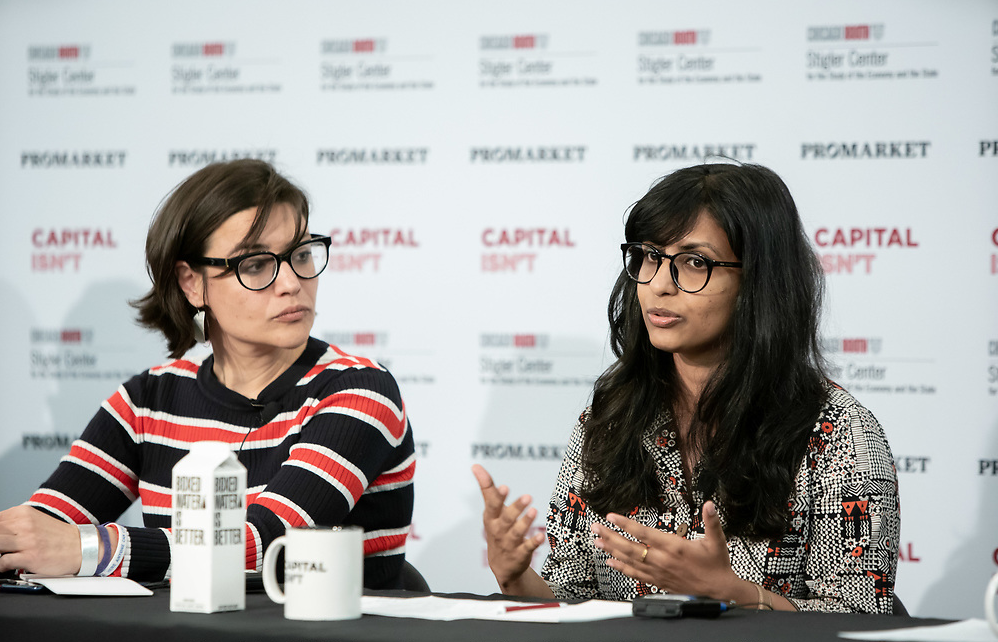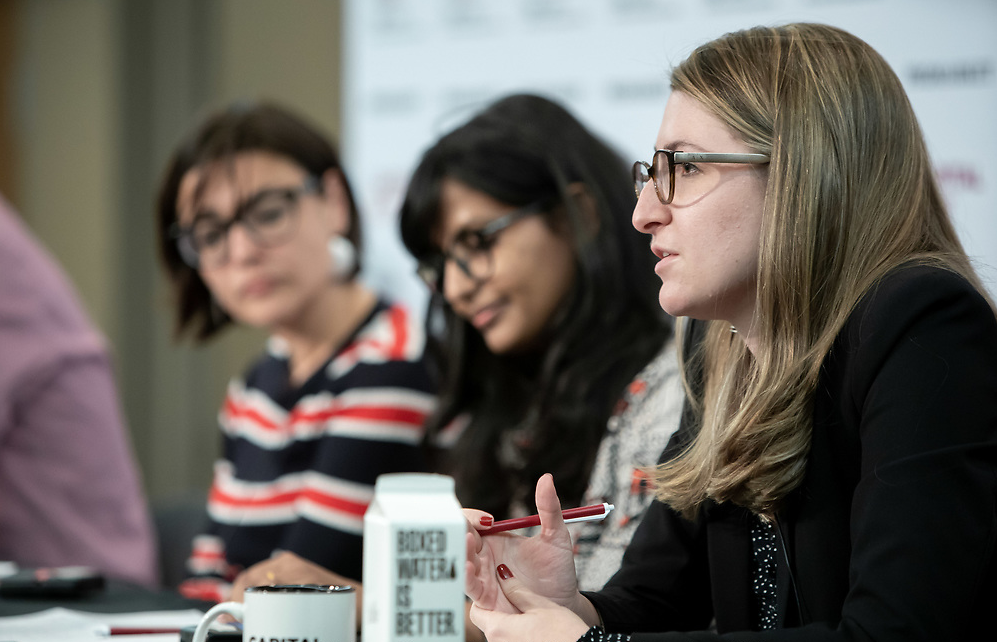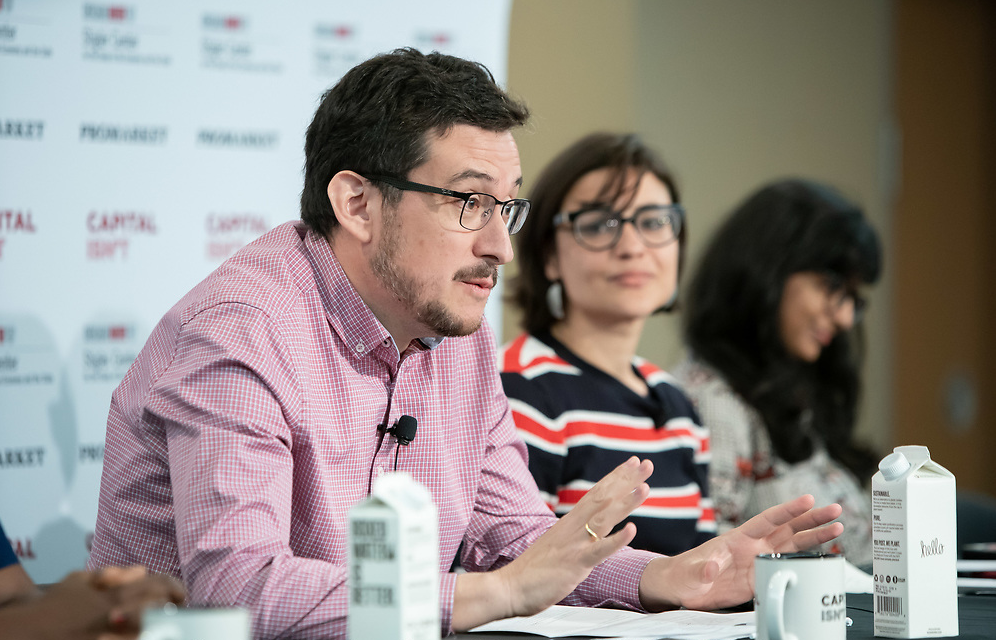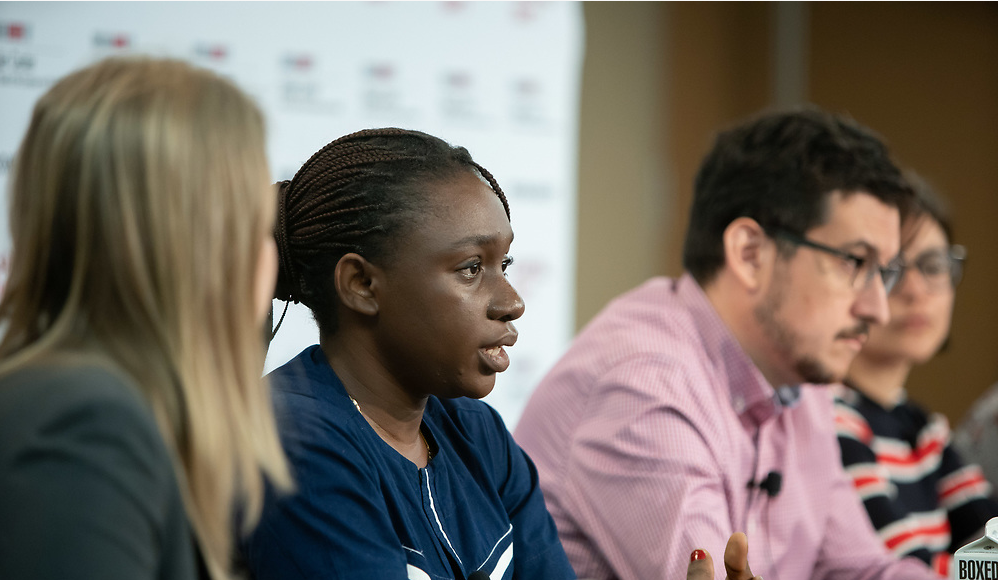The 2022 class of the Stigler Center’s Journalists in Residence program offer their thoughts regarding the Russia-Ukraine conflict.
On Tuesday last week, the Stigler Center’s Journalists in Residence convened at Chicago Booth to offer international perspectives on the Ukrainian conflict. The journalists, who hail from Nigeria, Brazil, Chile, Italy, and India, shared the strategic and economic considerations that shape their countries’ perception of the conflict.
As Chris Wheat, Executive Director of the Stigler Center, pointed out in his opening remarks, the Journalists in Residence program was established in part to help break out of a bias toward US and EU perspectives and create a forum to compare views across the world. The journalism fellows are at the University of Chicago Booth School of Business for ten weeks to take classes, participate in Stigler Center lectures and discussions, and interact with students, faculty, and other fellows. Members of the 2022 cohort speaking on Ukraine were Adesola Afolabi (Stears Business, Nigeria), Rodrigo Cardenas (La Tercera, Chile), Giovanna Faggionato (Domani, Italy), Tanya Thomas (Freelancer, India), and Stephanie Tondo (O Globo, Brazil). The discussion was moderated by Brooke Fox, managing editor of ProMarket and herself a member of the inaugural 2017 cohort of the Journalist in Residence program.
All five journalists’ countries have been directly or indirectly affected by the conflict in Ukraine. Whether or not a country has direct trade ties or alliances with Russia, the shocks to the global wheat and oil and gas markets caused by the invasion are causing price hikes and inflation. Wheat shortages, rising prices for agricultural inputs, and spiking energy costs are disproportionately impacting the poorest countries and populations, but globally everyone is feeling the pinch.

International perspectives on the conflict vary more widely than American audiences might realize. As the Ukrainian conflict drags on, concerns about inflation and increasing food insecurity are tempering initial public sympathy for the Ukrainian cause in some regions. Other countries, notably India, have a strategic desire for Russia to remain a regional counterweight. In South America, some far-right and far-left politicians and countries are less supportive of Ukraine out of solidarity with Russia, or as a stand against Biden and the US, while in Nigeria, public sentiment is so pro-Ukraine the government has forbidden its citizens from going to Ukraine to participate in the conflict.
India, according to Tanya Thomas, has perhaps the most different view of the conflict from the US, rooted in strategic national self-interest. As the largest democracy in the world, India’s refusal to penalize Russia with sanctions has been criticized by the US and EU, but the country has had a warm relationship with Russia since independence in 1947. Russia invested in infrastructure, aid, and cultural exchange and India’s relationship with Russia is seen as a deterrent to encroachments by Pakistan and China. Currently 80 percent of India’s military hardware is imported from Russia, though supply from Israel and France is expanding. As in much of the rest of Asia, India feels it’s in their interest to keep Russia as a counterpoint to China and other local and global powers.
In Latin America, sentiments range from broadly pro-Ukrainian to disapproval of the US’s perceived involvement in the conflict. Stephanie Tondo of O Globo explained that Brazil is in the latter group, declining to impose sanctions. Leaders have criticized the war but also criticized delivery of weapons to the Ukrainians. The Brazilian President Jair Bolsonaro is pro-Putin and anti-Biden, but he is particularly concerned by inflation given that it is an election year. The agribusiness sector, one of Bolsonaro’s biggest backers, has been hit hard by the conflict. About 20 percent of Brazil’s fertilizer comes from Russia, and the price has doubled, affecting food prices. The nation, a large commodity exporter, is having trouble delivering to Russia, partly due to international companies declining to export to the embattled country.

Chile, in contrast, has a broadly pro-Ukrainian view. Both the outgoing right-wing and incoming left-wing presidents condemned the conflict. Chile is more fiscally distant from Russia, but imports all fuel and almost all food from international trading partners. Rodrigo Cardenas of La Tercera explained that bread is a staple food: Chile is one of the largest consumers of wheat in the world with almost double average consumption per capita. Inflation is at its highest level in several decades, but the country is the most economically secure in Latin America: inflation is at 10 percent, compared with 50 percent in Argentina.
Though Nigeria is a top oil producer, the energy crisis and rising fuel prices provoked by the conflict are hurting the economy, with much greater impact on food security than in Chile. The country has the ninth largest gas reserves in the world but would need massive investment in pipeline infrastructure to be able to supply the EU. Adesola Afolabi of Stears Business told the room that, also lacking refining infrastructure, Nigeria exports crude but imports refined oil, meaning high prices have depleted foreign reserves and economic stability. Adding to the economic pummeling, over 30 percent of Nigeria’s wheat comes from Russia and Ukraine. Before the conflict, 6 out of 10 Nigerians were food insecure and that’s risen to 8 out of 10. The World Bank has predicted that another 3 months of war will lead to severe hunger, not only due to high food prices but also to the economy-wide impact of energy shortages.

Italy has even deeper ties to Russia. While public opinion was at first driven by shock and solidarity with Ukraine, Giovanna Faggionato of Domani said that fear of escalation and inability to see the path toward cease fire is complicating views. Italy and Russia are economically intertwined: Italy had $27 billion in trade with Russia in 2021. The country depends on Russia for over 45 percent of gas and 7 percent of exports go to Russia, primarily luxury goods, machinery, and food. The business community has always been in favor of a good relationship with Moscow. While the EU is attempting to wean itself, independence from Russian gas would require three years given the interplay of spot prices and long contracts in the energy market and Italy will remain dependent on Russia during that transition period. This insight, among the many others shared by the panelists, made clear how crucial global viewpoints are to understanding geopolitical and economic events and trends.






